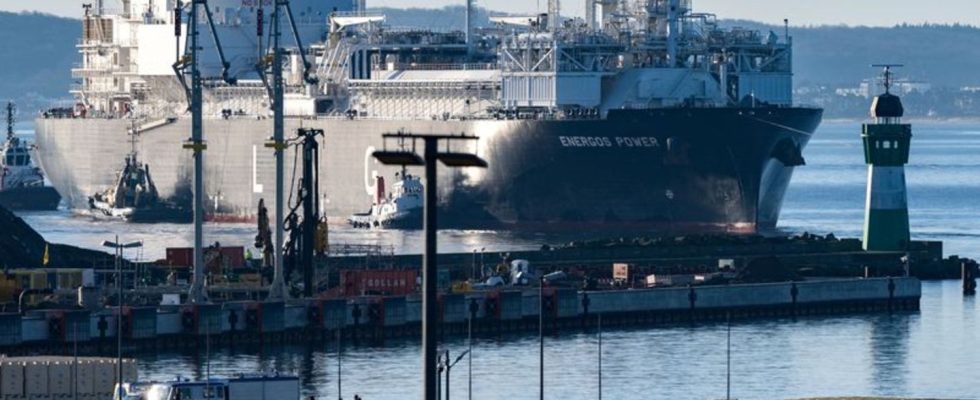energy
Federal government: Gas alarm level remains in effect
The almost 300 meter long “Energos Power” enters the port of Mukran accompanied by tugboats. photo
© Stefan Sauer/dpa
There has recently been talk in many places of an easing of the gas supply situation. Nevertheless, the federal government is sticking to the gas alarm level. And the Rügen LNG terminal is also still necessary.
The federal government still considers the gas supply situation to be tense. There is currently no intention to end the alert level of the gas emergency plan that has been in effect since summer 2022, the Federal Ministry of Economics said in a response to a parliamentary question. The gas supply situation remains tense compared to pre-crisis levels.
The commissioning of the controversial Rügen terminal for liquefied natural gas (LNG) is also “required as essential and necessary insurance against a possible gas shortage or even a gas shortage,” says the answer to the AfD member of the Bundestag Leif-Erik Holm, which is available to the German Press Agency.
DIW: The situation on the gas market has eased
However, from the perspective of the German Institute for Economic Research (DIW), the situation on the gas market has eased. A gas shortage that would justify the accelerated expansion of LNG infrastructure never occurred, the DIW recently said. The planned expansion of LNG import capacities is no longer necessary to this extent. DIW expert Claudia Kemfert told the Funke newspapers that “it is time to repeal the gas emergency plan.”
The alert level describes a significant deterioration in the natural gas supply situation. Indicators for this include the absence or serious reduction of natural gas flows, long-term very low natural gas storage levels, extreme weather conditions coupled with very high demand, a high risk of long-term undersupply or EU states requesting gas deliveries from Germany.
Federal Economics Minister Robert Habeck (Greens) recently said in the Bundestag: “The energy supply is secure, the storage facilities are full even at the end of the second winter.” Gas prices were recently at the level before Russia’s attack on Ukraine.
Holm: Extremely costly excess capacity
Holm criticized sticking to the alert level and the Rügen terminal: “Extremely costly overcapacity is being created, which also endangers the environment and important tourism on Rügen.” According to the operator, the terminal should be ready for operation shortly.
In response to Holm’s question, the federal government points out that there are still serious difficulties in ensuring energy supply security at EU level. The Mukran terminal location on Rügen is “very important for the national and European energy supply”, particularly due to the feed-in option in eastern Germany.
Proponents of the terminal had repeatedly referred to the connection to its eastern and southern neighbors. The Federal Network Agency points out that if remaining Russian gas deliveries to Southeastern Europe were stopped, these states in a shortage situation would have to be supplied via Germany. In Austria, for example, according to the government there, 98 percent of gas imports continued to come from Russia in December 2023.

